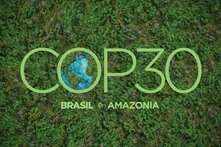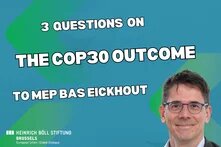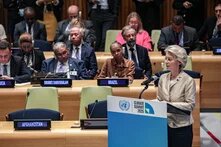Where in the global dialogue is the aspiration for adaptation, equitable climate finance and inclusivity? What practical actions will the global community take to address these cardinal objectives? For African countries - which have contributed least to climate change but remain most vulnerable to its impacts - these objectives are as important as net-zero ambitions.

Read our web dossier on the COP26.
In a year like no other, the 26th Conference of Parties (COP) is happening in a world battered by a pandemic and extreme weather events from a changing climate. These crises have disproportionately affected certain parts of the world, including the least developed countries in Africa. Across Africa, climate change is threatening economies and livelihoods. For countries in that region, Glasgow cannot afford to be just rhetoric. It must be about action.
The COP 26 presidency has outlined some key objectives for Glasgow: getting all countries to commit to net-zero targets, including emissions-reduction targets by 2030; planning for climate adaptation; encouraging wealthier nations to provide financing for climate adaptation and mitigation; making progress on loss and damage and strengthening civil society participation in the climate negotiations.
The net-zero agenda has been a strong rallying point for action in the lead-up to COP 26. The concept emerged after the release of the 2018 IPCC report, which called for radical action to limit the average global temperature increase to 1.5°C above pre-industrial levels. Earlier this year, the International Energy Agency (IEA) also published the Net Zero by 2050 Report: a roadmap for decarbonizing the global energy system by 2050. Thirty-one countries and the EU have adopted net-zero targets in law and policy documents, with several other countries actively discussing targets. Over 1500 private companies have also announced net-zero ambitions.
Globally, there has been a strong push for specific net-zero oriented policies such as ending support for the construction of new coal power plants and phasing out existing ones, shifting vehicle fleets away from diesel and gasoline and ending the financing of fossil fuels. In the last few months, these calls have led to major announcements from countries, regional blocs and the private sector.
For example, General Motors recently announced plans to shift from gasoline and diesel-powered engines to electric vehicles by 2035. At the United Nations General Assembly, China announced plans to stop all overseas coal financing. In August, the United States Treasury Department issued guidance instructing their representatives in multilateral institutions, such as the World Bank and the Inter-American Development Bank, to block overseas financing for natural gas exploration and production and new coal and oil projects (with a narrow path for mid and down-stream gas projects, power plants and import facilities in some exceptional circumstances). Earlier this year, the EU also announced plans to limit investments in fossil fuels in developing countries.
The COP presidency aspires to have all countries commit to net-zero targets, including commitments to cut emissions by 2030. This aspiration includes African countries. Hydrocarbon-dependent African countries are trying to understand what the fossil fuel financing moratoria by multilateral banks, the US, the EU and China will mean for their economies and energy systems and how they can reposition themselves in a rapidly evolving global energy landscape.
Beyond Net Zero: What Africa wants from COP26
African countries are interested in more than just net-zero targets and strategies. They also want to see ambitious targets for other COP 26 objectives. Where in the global dialogue is the aspiration for adaptation, equitable climate finance and inclusivity? What practical actions will the global community take to address these cardinal objectives? For African countries - which have contributed least to climate change but remain most vulnerable to its impacts - these objectives are as important as net-zero ambitions.
The current situation in Madagascar typifies the disproportionate impacts of climate change on the most vulnerable people and economies. Currently, over one million people in Madagascar face severe food insecurity as the country reels from the effects of a four-year drought—the worst in over 40 years. Disturbing reports of having to survive on locusts, raw red cactus fruits and wild leaves reveal just how desperate people are. And yet, Madagascar’s contribution to cumulative greenhouse gas emissions since 1933 stands at around 0.1%.
Madagascar is not alone. Over the past decade, the impacts of climate variability across Africa have become more pronounced. In 2019, Cyclone Idai tore through Mozambique, Zimbabwe and Malawi, killing a thousand people and destroying over 100,000 homes. Mozambique has been hit by three more cyclones since Idai, with over 100,000 people still displaced in Central Mozambique and another 670,000 in the north of the country.
In 2018, Cape town almost ran out of water. In the Horn of Africa, floods and landslides have taken lives and destroyed the livelihoods of many. West Africa has also been identified as a potential climate hotspot; there, climate variability is expected to impact crop yields and productivity with potentially devastating effects on food security.
What these afflictions show is that African countries need, as a matter of urgency, to adapt to the impacts of climate change. Yet climate adaptation and climate finance remain sticky issues in climate negotiations. At COP 15 in 2009, wealthier countries committed to contributing USD 100 billion per year to assist developing countries in responding to climate change. The United Nations Environment Program estimated that developing countries would require up to USD 300 million per year by 2030 to support climate mitigation and adaptation. Not only does the USD 100 million target promised by the developed world fall woefully short of that projected USD 300 billion, developed countries have also failed to deliver on their USD 100 billion promise. In 2018, climate finance was off target by around USD 20 billion.
There is also an imbalance in what climate finance supports. Because developing countries are already confronted with the threat of climate change to agricultural, economic and social systems, they have asked for financial support to be evenly split between adaptation and mitigation needs. This hasn’t happened; the lion’s share of climate finance has gone to mitigation projects, with less funding going to adaptation efforts that could have shielded the people of Madagascar and Mozambique from climate change impacts.
This is not all; the structure of climate finance has also perpetuated greater inequities between countries and impacted their abilities to respond to the climate crisis. Financial support to developing countries has largely been disbursed as loans and not as grants. According to the Organization for Economic Co-operation and Development (OECD), between 2013 and 2018 the share of loans in public climate finance grew from 52% to 74% while the grant component decreased from 27% to 20%. The terms of these loans are prohibitive, and their very design excludes the poorest and most vulnerable countries from benefitting. According to OECD data, in 2018 as many as 60 countries accessed climate loans at interest rates exceeding 18%, for projects of two-years or more. These prohibitive loan terms mean that the lion’s share of climate finance has gone to middle income countries. The least developed countries most vulnerable to the impacts of climate change, mostly in Sub-Saharan Africa, and small island developing states have only accessed 14% or 2% of climate finance, respectively.
Now that there is a better understanding of the human-induced impacts of climate change and the disproportionate ways in which these impacts are felt, all hands are needed on deck to address the climate challenge, including those of the private sector. Unfortunately, private capital in climate finance has been limited, with a resulting disproportionate reliance on public finance. The era of privatizing benefits and socializing costs must be left behind. The private sector must also begin to play a role in financing climate goals in developing countries.
The era of privatizing benefits and socializing costs must be left behind. The private sector must also begin to play a role in financing climate goals in developing countries.
A potential area for deepened private sector support could be in fossil fuel emissions mitigation in Africa. Global companies, including Eni, BP, Kosmos Energy, Chevron, Total and Shell, are all players in Africa’s Liquefied Natural Gas (LNG) market. Many of these large global players have announced net-zero targets by 2050. These targets must be backed by clear, transparent and measurable actions to cut emissions and support countries’ transition plans, including ones for their Africa operations. Such pledges could be an indirect way of getting the private sector to commit to and practically pay for emissions reductions efforts in their international operations, rather than leaving developing countries to rely on financing promises that may never be realized.
The challenges of accessing climate finance and the historical neglect of adaptation, loss and damage on the climate agenda are expressions of deeper inequities in the climate arena and reflect the limited bargaining power in global climate negotiations of the countries most affected by climate change.
Developing countries have also struggled to get developed countries to address the issue of loss and damage. An actionable strategy must be established to elevate the historically sidelined issue in climate negotiations that sees extreme weather events disproportionately displace populations and damage infrastructure across Africa.
The challenges of accessing climate finance and the historical neglect of adaptation, loss and damage on the climate agenda are expressions of deeper inequities in the climate arena and reflect the limited bargaining power in global climate negotiations of the countries most affected by climate change.
Developing countries lack agency because they are poor. Hence, even though a COP26 objective is to get civil society to participate more actively in the climate talks, that objective is already facing setbacks. The UK government’s vaccine and quarantine recommendations for participation at COP 26, automatically exclude several participants from the developing countries – those who are the most vulnerable to climate change. Only 2% of Africa’s population have received at least one dose of a coronavirus vaccine. These low vaccination rates, coupled with the costly quarantine requirements, can limit effective engagement from African stakeholders.
Ultimately, effective engagement in climate action from African countries will rest on their ability to set their own agenda and act on solutions suited to their contexts, without having to perpetually depend on external support to act.
Poverty does not only make communities more vulnerable to the impacts of climate change; it also limits their ability to contribute productively to framing solutions that work for them. Ultimately, effective engagement in climate action from African countries will rest on their ability to set their own agenda and act on solutions suited to their contexts, without having to perpetually depend on external support to act. Building this agency implies elevating poverty alleviation and development in climate discussions.
So, while we may all agree that COP 26 is a crucial moment for addressing the climate emergency, we must also recognize that its effectiveness will depend on how well the agenda is refocused to be inclusive of objectives that matter to all countries, both rich and poor. We must look beyond net zero.
This article was first published by the Africa Policy Research Institute (APRI), as part of a series of special thought pieces that APRI is publishing in partnership with the African Climate Foundation in the run up to COP26 in Glasgow. The series is titled From Rio 1992 to COP26: Africa’s Climate Journey and the Road Ahead.


